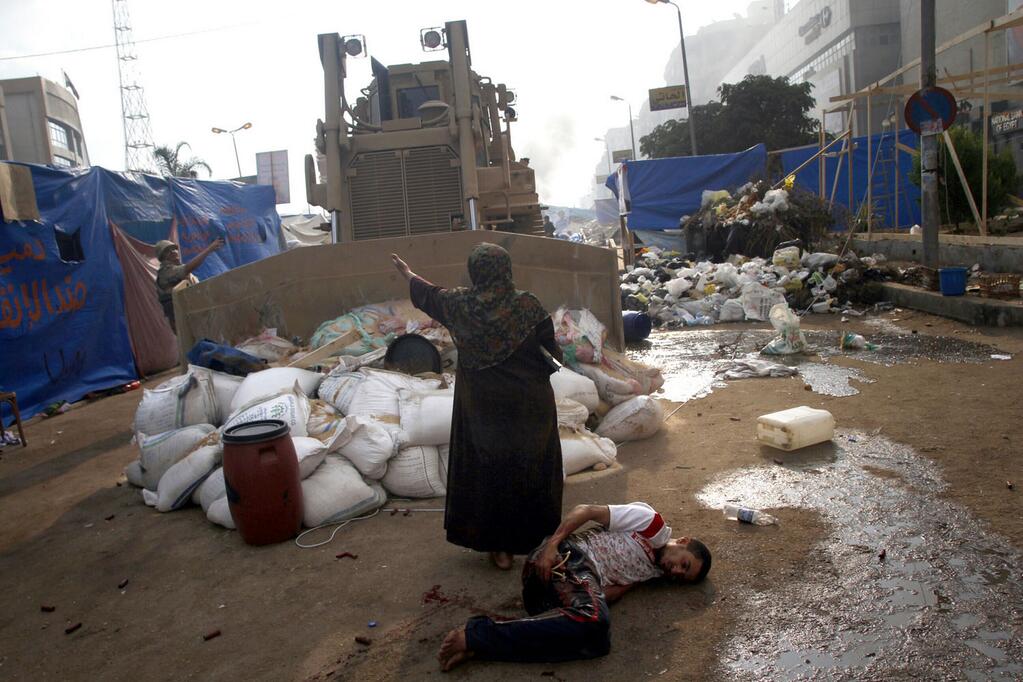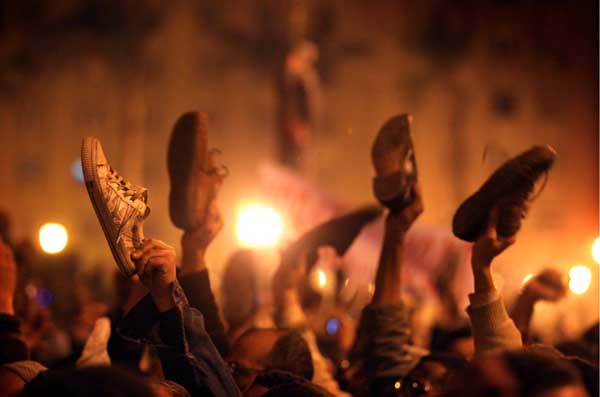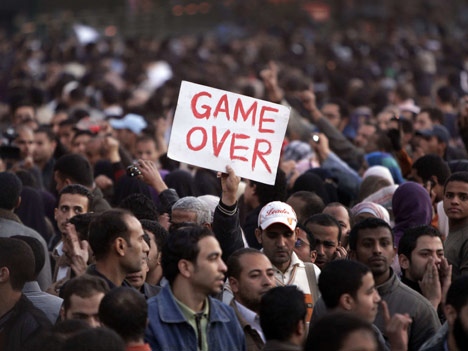Yet More Advice
If you find a?vassal?country takes a path that you dislike,
It’s your duty to divert it, with a bold preemptive strike.

But when bleeding troops and money, you had better think of ways,
By which to wield your influence.? A little thinking pays.
You can call for free elections and for freedom of the press.
If you don’t like who’s elected, push for freedom to repress. Continue reading “Egypt: Advice to Vassals”
Tag: Mubarak
THE END OF AUTHORITARIANISM IN THE ARAB WORLD?
Subscribe to ShahidulNews
Mubarak’s Ignominious Departure and the Fear Factor
by rahnuma ahmed
Mubarak is gone! Egypt is free!
Equally true is the fact that power has been assumed by the Supreme Council of the Armed Forces. That the 30 year-old state of emergency has not yet been lifted, neither has any time frame been set, nothing beyond the invocation, “as soon as the current circumstances are over.” ?Equally true is the fact that Egypt’s new, transitional (military) rulers have been quick to affirm Egypt’s commitment to all regional and international obligations and treaties, an implicit signal that the treaty of all treaties, Egypt’s peace treaty with Israel?propagated as a bulwark for peace and stability in the region, but in reality, one which helps sustain Israel’s military occupation of the West Bank and the seige of Gaza?is not under threat. An affirmation swiftly welcomed by the Israeli prime minister Benjamin Netanyahu, who described the treaty as “having greatly contributed to both countries,” as “the cornerstone for peace and stability in the entire Middle East”; close at his heels was US president Barack Obama who welcomed the Egyptian pledge to “stand by” its international obligations.
But, it is also true that while Egyptian demonstrators, both young and old, rallied to scrub off slogans and graffiti from walls, to clean up the streets of Cairo of rocks, debris of violence, charred remains of Mubarak’s effigy (“Clearing the streets is just a start. It is our country now”), protestors still camped out in Tahrir square, refusing to leave until the military issued official statements on their next steps. It is also true that pro-democracy activists insist that their revolt was not against one man but against the whole regime, which Mubarak and his predecessors, had instituted. It is also true that their invincible strength prevented Omar Suleiman?the CIA’s man in Cairo who devised and implemented the programme for renditioning and torturing terrorist suspects,?in whom Mubarak transferred authorities while still clinging to power?from taking charge. Pro-democracy activists insist that the revolution will not be over until all responsible for the hundreds of deaths will be investigated, tried and punished. It will not be over until Egypt’s stolen funds are restored.
Swiss banks have frozen assets of the ousted president, who is currently hunkered down in his residence at the Red Sea tourist resort, Sharm al-Sheikh. Former interior minister Habib El Adly, former prime minister Ahmed Nazif have been banned from travelling, their assets have been frozen. Former information minister Anna El Feqy has been placed under house arrest while rumors fly of business tycoons fleeing. But it is also true that while figures are totted up of how much the former president, his Welsh wife and their son fleeced Egypt, that while the huge personal wealth amassed by other members of the corrupt coterie are calculated, one does not hear of corruption within the army. That these stories are silenced.
But it is undeniable that the mass uprising was organic. One that persisted after Mubarak’s ouster, attested to by scenes of youths in Alexandria, the mainstay of the uprising, stopping cars and telling their occupants, abide by traffic rules. Of telling pedestrians, do not give bribes, read up the constitution.
It is also true that the mass uprising did not occur overnight but was, as Marwan Bishara reminds us, “the culmination of countless sit-ins, strikes, pickets, and demonstrations.”
That behind the 18 day popular revolt lies long years of grassroots mobilisation, the tireless efforts of scores of coalition builders who worked with labour unions and opposition parties, both old and new, including the Muslim Brotherhood. That we must not forget people such as, says Bishara, the late Mohammad El-Sayed Said who helped to found the Cairo Institute of Human Rights Studies and, the Egyptian Organisation for Human Rights. Who underwent arrest and torture for writing the “much-acclaimed report about the punishment of dissidents by torture” (Al-Ahram). Who died last year after a long period of ill-treatment at the hands of the Mubarak regime, and a 2-year struggle with cancer. Who was “much missed in Tahrir Square.” There were many others.

It is also true that Mubarak was suffering from severe delusions when he confided in a 20 minute telephone conversation to former Israeli defense minister Binyamin Ben-Eliezer, a close friend and ally, that he was looking for “an honorable way out” (Press TV, February 12, 2011). ?This was on Thursday, February 10, the day he refused to step down as anticipated, offering his “children” constitutional changes instead, and transfer of authorities to Suleiman. It was the speech greeted with raised shoes, the ultimate sign of dishonor for leaders and politicians in our parts of the world. One that was globally iconised by Muntazer al-Zaidi, the Iraqi journalist who threw his shoe at George Bush in 2008. A farewell parting.
Continue reading “THE END OF AUTHORITARIANISM IN THE ARAB WORLD?”
PART I THE END OF AUTHORITARIANISM IN THE ARAB WORLD?
Subscribe to ShahidulNews
`Go, Mubarak go!’ ?USA’s tottering user-friendly tyrants…
By Rahnuma Ahmed
Having grown up amidst popular uprisings, such as the Civil Disobedience movement in 1969, and much later, having participated in mass uprisings, foremost among them, the one against general HM Ershad’s regime in 1990, witnessing scenes of the unfolding peoples’ revolt against the US-bolstered 30-year old Mubarak dictatorship in Egypt, relayed live, courtesy of al-Jazeera television, is, well…, just great!

Every passing moment contributes to our history on earth, but some moments are crucial for they change history, writes Ashraf Ezzat, medical doctor and political analyst, from Alexandria. What the world now witnesses in Egypt, is not only the crumbling down of a dictatorship that stifled Egyptians for decades but “a whole age of authoritarianism in the Arab world.”
It all began in Tunisia. Mohammed Bouazizi, 26, a vegetable-seller, set himself on fire on December 17, 2010 after police confiscated his unlicensed produce stand; he died on Jan 3. Protests against unemployment, police brutality and the regime’s corruption increased, leading to the toppling of president Zine al-Abidine Ben Ali’s regime, a dictator who had ruled for 23 years, was re-elected president five times, each time winning 99.9%-89.62% votes, who amended the constitution in 2002 to allow the president (read, himself) to stay in power until the age of 75, to be re-elected unlimited times. After a 29 day popular uprising, Ben Ali, who headed “one of the Arab world’s most repressive regimes” (Guardian, January 15, 2011), ?who was a “stalwart US ally” (Foreign Policy, February 5, 2011)?was forced to flee, to take refuge in Saudi Arabia. Prime minister Mohamed Ghannouchi took over as interim president as soldiers guarded ministries, public buildings and the state TV building, as security forces were authorised to fire live rounds.
“Freedom is expensive and my brother paid the price of freedom,” said Salem, Bouazizi’s brother. “My brother has become a symbol of resistance in the Arab world.”
So true he was, as instances of self-immolation followed soon. An Egyptian man set himself alight near the parliament, a Mauritanian in front of the presidential palace in Nouakchott, the capital, while four unemployed young men reportedly immolated themselves in Algeria.
Continue reading “PART I THE END OF AUTHORITARIANISM IN THE ARAB WORLD?”
Tunisia Egypt Global Revolution Tribute
Thinking the Unthinkable: Is the Gulf Next?
Subscribe to ShahidulNews
By James M. Dorsey | 02 FEB 2011
Thinking the Unthinkable: Is the Gulf Next?
It?s time to think the unthinkable: Saudi Arabia and other oil-rich Gulf states may be getting in line for their turn at confronting widespread popular discontent.
As a wave of mass protests sweeps the Arab world, shaking the regime of Egyptian President Hosni Mubarak to the core, rumblings of popular restlessness are bubbling to the service in the Gulf.
Shiite opposition groups in Bahrain, a strategic island kingdom that hosts the U.S. Navy?s 5th Fleet, have called for?protests on February 14 to demand greater political freedom, a halt to attempts to redress the sectarian balance in a Shiite-majority country ruled by a Sunni minority, an end to human rights abuses and improved economic opportunities.
Over the past month,?Saudi Arabia?s dismal soccer performance in the Asian Cup, unemployment, floods in Jeddah that killed at least four people and the granting of asylum to the ousted Tunisian leader have sparked protests and criticism on newspaper op-ed pages as well as on blogs and in Internet chat rooms.
Read more of the story at?The Turbulent World of Middle East Soccer
——–
James M. Dorsey, a former Wall Street Journal foreign correspondent, writes about ethnic and religious conflict. He is the author of The Turbulent World of Middle East Soccer blog.
======================================================
=======================================================
Dear friends,
Millions of brave Egyptians are right now facing a fateful choice. Thousands have been jailed, injured or killed in the last few days. But if they press on in peaceful protest, they could end decades of tyranny.
The protesters have appealed for international solidarity, but the dictatorship knows the power of unity at a time like this ? they?ve desperately tried to cut Egyptians off from the world and each other by completely shutting down the internet and mobile networks.
Satellite and radio networks can still break through the regime blackout — let?s flood those airwaves with a massive cry of solidarity showing Egyptians that we stand with them, and that we?ll hold our governments accountable to stand with them too. The situation is at a tipping point — every hour counts — click below to sign the solidarity message, and forward this email:
Yasmine Jaffri
?https://secure.avaaz.org/en/democracy_for_egypt/97.php?cl_tta_sign=887eb39ee0031d3012345f2fa90c21cf?
People power is sweeping the Middle East. In days, peaceful protesters brought down Tunisia?s 30-year dictatorship. Now the protests are spreading to Egypt, Yemen, Jordan and beyond. This could be the Arab world’s Berlin Wall moment. If tyranny falls in Egypt, a tidal wave of democracy could sweep the entire region.
Egyptian dictator Hosni Mubarak has tried to crush the rallies. But with incredible bravery and determination, the protesters keep coming.
There are moments when history is written not by the powerful, but by people. This is one of them. The actions of ordinary Egyptians in the coming hours will have a massive effect on their country, the region, and our world. Let?s cheer them on with our own pledge to stand with them in their struggle:
?https://secure.avaaz.org/en/democracy_for_egypt/97.php?cl_tta_sign=887eb39ee0031d3012345f2fa90c21cf
?Mubarak?s family has left the country, but last night he ordered the military into the streets. He?s ominously promised 0 tolerance for what he calls ?chaos?. Either way, history will be made in the next few days. Let?s make this the moment that shows every dictator on our planet that they cannot stand long against the courage of people united.
With hope and admiration for the Egyptian people,
Ricken, Rewan, Ben, Graziela, Alice, Kien and the rest of the Avaaz team
More Information:
Egypt unrest: Alert as mass protests loom
http://www.bbc.co.uk/news/world-middle-east-12303564
Egyptian government shuts down the Internet
http://www.renesys.com/blog/2011/01/egypt-leaves-the-internet.shtml
North Africa: Will dominoes fall in the region?
http://allafrica.com/stories/201101280659.html
‘Beginning of the end’ for Egypt’s Mubarak as son and wife flee
http://www.ibtimes.com/articles/105117/20110126/beginning-of-the-end-for-egypt-s-mubarak-as-son-and-wife-flee.htm
Amnesty International condemns the crackdown on demonstrations
http://amnesty.org/en/news-and-updates/egypt-must-stop-crackdown-protesters-2011-01-26
Regular updates are being posted by Egyptian activists here:
http://www.elshaheeed.co.uk
ACCESS campaign for digital freedom in Egypt:
https://www.accessnow.org/page/s/help-egypt
